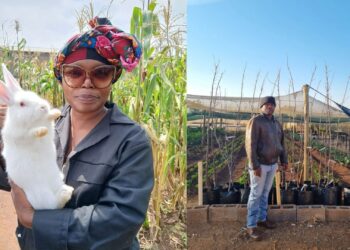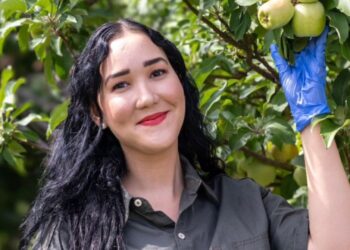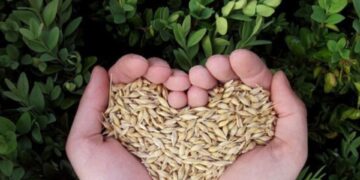
Just 10km outside of Stellenbosch in the Western Cape, but a world away from the oak-shaded streets of Stellies, you will find a quiet valley that locals call Stellenboschkloof. It is there where lavender farmer Ingrid de Waal spends hours of her time, tending the bushy and strong-scented perennial plants grown on her wine and lavender farm called Canettevallei.
De Waal is one of the few female producers of lavender and one of the only lavender suppliers in the country. She is also one of the very few producers of raw lavender honey found in Mzansi.
Canettevallei grows lavender using organic practices to develop unique, farm fresh lavender products. Their main products are lavender essential oil and lavender rice, as well as the sweet-smelling dried flowers of the lavender plant.
In 2015, De Waal was awarded the top commercial entrepreneur at the Western Cape female entrepreneur awards, which recognises women making a difference in the agricultural sector.
Not a limelight seeker
But all the accomplishments and accolades mean little to her.
“I’ve never been a limelight person. I usually run away from it. Yes, it’s nice to be recognised and taken note of, but that’s not really important to me. For me it’s about the joy I get from my work and what I can teach other people.”

De Waal says she places more value on the advancement of her employees. She feels that they should feel proud about the products they help produce.
“There’s no use in me winning prizes when the people who help create the products are not proud of what they are doing and progressing in life,” she states.
De Waal’s first encounter with lavender was in Provence in France.
After completing her studies, she lived in the northern parts of France, working for a champagne house. It was there where she fell in love with the purple plant.
When she returned to South Africa, she met her now husband Daniel, who is a wine farmer. The pair decided to plant lavender in front of their home on the farm. In 2015, the small patch in front of their home was upgraded to three hectares of lavender fields.
“We always knew we’d open our tasting room, but in the wine industry when you open the farm to the public people want an experience and not just wine. Lavender is visually very appealing and there’s a romantic idea attached to it.”
However, the pair soon realised that the lavender plant they used only blooms for five weeks in December and January. Thereafter, the lavender bush rests for the remainder of the year until around October when it starts showing signs of life again.
De Waal says, “Tourists would visit and not understand why there were no lavender flowers, so we decided to plant a different type as well which gives us a flower for six months. When nothing is sprouting here in the winter months, we have these beautiful lavender fields.”
Unfortunately, these cannot be used for oil making, so she found other uses for it.
Being a lavender farmer
De Waal explains that being a lavender farmer is not as hard as some may think.
“It’s really not that difficult. There’s no pests or animals that eat it and we literally spray nothing. It grows by itself, naturally,” she says.

The only problem De Waal experiences is waterlogging during winter when there’s a lot of rain.
According to her, challenges like these have been enough for farmers to turn away from lavender cultivation.
When de Waal started out there were only about six other growers in the province. Most of them gave up and pulled out their lavender.
“Many farmers produced the oil in bulk and could only sell to one buyer, who manipulated prices because there was no-one else to sell to. That’s why people gave up. But we took a different approach.”
In 2008, she started manufacturing her own lavender products under her own brand name. She would load her products in the back of her car and take them to health shops.
“It was a very good period to enter the market because there were only two lavender labels on the market. One was a local brand and the other an imported one. This gave me great footing. I came in with a very good price because it was direct marketing,” she says.
Investing in employees
While De Waal may not consider lavender farming hard, starting her own farm definitely was. She had no idea what she was doing, and the internet did not provide much information.
“Not a lot people even Googled at the time. I felt so alone, I could not phone anyone for advice when there was a problem, so I had to Google my way through it,” she says.
Most of the websites with information were in French. Luckily, she understood the language, which made it slightly easier.

Years of challenges later, De Waal today makes sure that she teaches her staff skills. She recently trained one woman as a soap maker, which apparently is no easy skill to master.
“The day she leaves, she can walk in anywhere as a trained soap maker. She’s got the necessary skills to walk into a top soap production company,” De Waal explains.
Currently the lavender farmer is also encouraging another employee to get her driver’s license. “These are women from a background where they didn’t even think of the possibility of having a driver’s license.”
But while upskilling her employees and creating employment opportunities for unemployed locals, De Waal says she looks forward expanding her farming business.
She wants to plant more lavender fields and also look into producing other oils like rosemary and malva.
Read: Lavender is changing lives in gang-ridden Lavender Hill
















